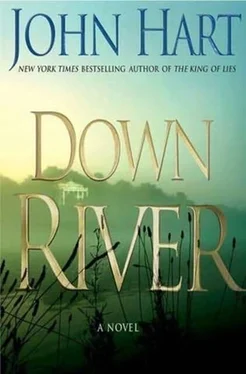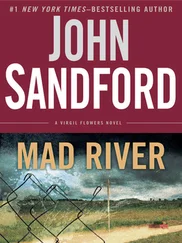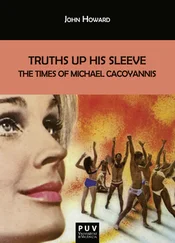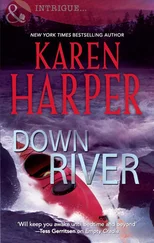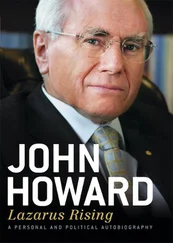“How deep is my father’s debt?” That was my question.
He looked at me for a long time, trying to figure me out. I knew that he and my father had spoken. He’d told me as much.
“Why do you want to know?”
“The farm has been in my family for two centuries. Much of the vineyard has burned. My father is in debt. If the farm is at risk, I want to help.”
“You should be talking to your father,” Parks said. “Not going through an intermediary.”
“I’m not ready to do that.”
He drummed long fingers on the table. “What do you propose?”
“He bought me out for three million. I’ll buy back in for the same price. It should be enough to see him through.”
“You have that much left?”
“I made good investments. If he needs more, I have it.”
The lawyer rubbed his face, thought about it. He looked at his watch. “Are you in a rush?” he asked.
“No.”
“Wait here.”
I watched him through the window. He stood in the parking lot, cell phone to his ear, and argued with my father. His face still held the heat when he came back to the table. “He said no.”
“Did he say why?”
“I can’t talk about that.”
“But he gave you a reason?”
The lawyer nodded. “A pretty good one.”
“And you won’t tell me what it is.”
He spread his hands and shook his head.
It was Dolf who finally explained it to me. He showed up at Robin’s the next morning. We spoke in the shade of the building, at the edge of the parking lot. “Your father wants to make things right. He wants you to come home, but not because you have a financial interest. Not to protect your investment.”
“What about the money he owes?”
“He’ll refinance, leverage more acreage. Whatever it takes.”
“Can he do it?”
“I trust your father,” he said, and the statement had layers of meaning.
I walked with Dolf to his truck. He spoke to me through the open window. “Nobody’s seen Jamie,” he said. “He hasn’t been home.” We both knew why. Miriam was his twin, and our father had shot her down. Worry filled Dolf’s eyes. “Look for him, will you?”
I called my broker in New York and arranged to transfer funds to a local branch. When I went looking for Jamie, I had a cashier’s check for three hundred thousand dollars in my pocket. I found him at one of the local sports bars. He sat in a booth in the back corner. Empties stretched from one end of the table to the other. As far as I could tell, he had neither shaved nor bathed in days. I limped to the table, slipped in across from him, and propped the crutches against the wall. He looked destroyed.
“You okay?” I asked.
He said nothing.
“Everybody’s looking for you.”
When he spoke, he slurred, and I saw in him the kind of anger that had all but destroyed me. “She was my sister,” he said. “Do you understand?”
I did. As different as they had been, they were still twins.
“I was there,” I said. “He had no choice.”
Jamie slammed a bottle on the table. Beer shot out and spattered my sleeve. People stared, but Jamie was oblivious. “There’s always a choice.”
“No, Jamie. Not always.”
He leaned back, rubbed giant, callused hands over his face. When he looked at me, it was like looking into a mirror. “Go away, Adam. Just go away.” He put his head in his hands and I slipped the check across the table.
“Anything you need,” I said, and hobbled out. I turned once at the door and saw him there. He held the check in his fingers, then put it down. He found me across the room and raised his hand. I would never forget the face that he showed me.
Then he looked down and reached for another beer.
When I went to see Grace, it was easier than I thought. I did not see my mother when I looked at her. In that, at least, my father had been right. It was not her fault, and I loved her no less. She looked worn, but the truth rested more lightly on her than it did on me. “I always thought my parents were dead,” she explained. “Now I have two, and a brother.”
“But Dolf’s not your grandfather,” I said. “You lost that.”
She shook her head. “I couldn’t love him any more than I already do. Nothing will change for us.”
“What about you and me? Is that weird?”
It took her a minute to answer. When she did, I felt the confusion in her. “Hope dies hard, Adam. It hurts. I’ll get used to it because I don’t have a choice. I’m just glad you didn’t sleep with me.”
“Ah. Humor.”
“It helps.”
“And Sarah Yates?”
“I like her, but she abandoned me.”
“Almost twenty years, Grace. She could have lived anywhere, but chose a place three miles upriver. That was no accident. She wanted to be near you.”
“Near is not the same.”
“No, it’s not.”
I guess we’ll see where it goes.”
“And our father?”
“I look forward to walking that road.” Her gaze was so level that I had to look away. She put her hand on mine. “Don’t leave, Adam. Walk it with me.”
I withdrew my hand, moved to the window, and looked out. A canopy of trees spread above the neighborhood behind the hospital. I saw a thousand shades of green. “I’m going back to New York,” I said. “Robin’s coming. We want you to come with us.”
“I told you before. I’m no runner.”
“It’s not running,” I said.
“Isn’t it?”
They buried Miriam on an unseasonably cool day. I went to the funeral and stood with Robin at my side. My father was there with Janice, both of them looking sleepless, weathered, and bleak. Dolf stood between them like a rock. Or a wall. They did not look at each other, and I knew that grief and blame were chewing them down. Jamie lingered on the fringe, sunken, with splotches of red on his cheeks. He was drunk and angry, with no forgiveness in his face when he looked at my father.
I listened to the same preacher who buried my mother, buried Danny. He wore the snowy vestment and spoke similar words, but they brought me no comfort. Miriam knew little peace in life, and I feared that her soul might share the same predilection. She died a killer, unrepentant, and I hoped that she’d found a better place.
I looked across her grave.
I prayed for mercy on her wounded soul.
When the preacher finished, my stepmother folded herself against the coffin and shook like a leaf in high wind. George Tallman stared into nothing as tears slipped off his chin to stain his dress blues dark.
I moved away from the small gathering and my father joined me. We stood alone under a distant sun. “Tell me what to do,” he said.
I looked at what remained of my family, and thought of Miriam’s prophetic words. The family had torn itself apart.
Cracks all over the place.
“You haven’t called the police.” I was speaking of the postcard.
“I burned it.” He looked down and repeated himself. “I burned it.”
Then he, too, began to tremble.
And I walked away.
I discovered something over the next year. New York with someone you love is better than the same city all alone. Ten times better. A thousand. But it wasn’t home. That was fact, simple and pure. I tried to live with it, but it was hard. When I closed my eyes, I thought of open spaces.
We had no idea what we would do with the rest of our days, only that we would spend them together. We had money and we had time. We talked about getting married. “One day,” she said.
“Soon,” I countered.
“Kids?”
I thought of my father and she recognized the pain. “You should call him back,” she said.
Читать дальше
